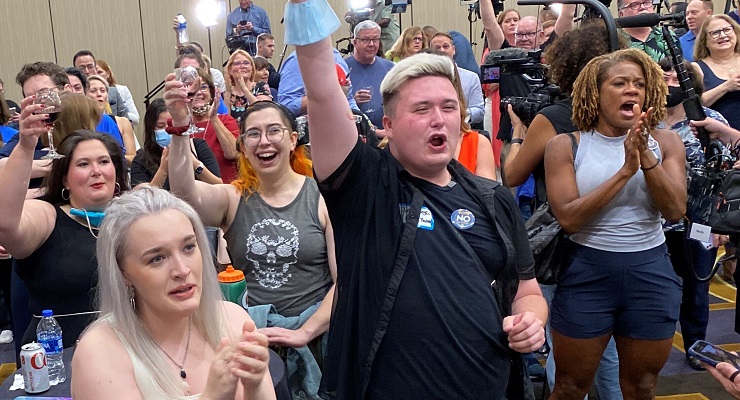
It was a shellacking. On Tuesday, during a primary vote in a deep-red American state that was expected to be dominated by Republican and independent voters, a referendum was on the ballot. The question asked Kansans to weigh in on access to abortion. Did they want the state’s robust constitutional protection of a women’s right to choose to stand, or for it to fall?
Sixty per cent of Kansans voted to protect abortion rights, a figure that dwarfed the 40% who wanted the constitution changed so the Republican-dominated state legislature could follow the lead of surrounding states and ban the procedure outright.
What happened? A doubling of voter turnout when compared to the 2018 primaries, in a country where voting is not compulsory. And while most of the increased turnout were Democrats, about one-fifth were Republicans who — like their independent and Democratic counterparts — weren’t just clustered in cities, but distributed across rural and regional areas of the state.
The victory would likely have been even more resounding had anti-choice forces defied their brand and played fair. By putting the question on the general ballot this November, rather than a primary in the dead of a hot summer expected to be dominated by Republicans and independents. By making the question shorter and sharper, and by framing the affirmative and negative more intuitively (if you wanted to keep the state’s constitutional protection of choice, you voted “no”). They could also have left out the disinformation texts sent the night before the poll, instructing pro-choice people to vote “yes”.
All of which bodes well for the ability of American women to use versions of the Kansas strategy to claw back the legal dignity and liberty they enjoyed under Roe v Wade. Not because there is a one-to-one match with the way reproductive choice battles will shake out in other states, but because there is not.
As Australians who have been forced to fight our reproductive battles state by state know, when local forces craft a placed-based campaign strategy based on their local knowledge and history — in Kansas, they harked back to the state’s formation as a free state founded by abolitionists, and longstanding libertarian objections to government intrusion in people’s lives — the odds of victory increase. This advantage then builds on the inherent one in any campaign for reproductive rights that is closer to the people — ballot initiatives v court judgment — because as Republicans have known since at least the 1990s, and recent polling continues to show, the numbers are on the pro-choice side.
The Kansas story is uplifting because it reminds us of two things. One is that American women aren’t going to accept being told by the Supreme Court or the Republican party that their rights aren’t worth a hill of beans. They are clever, resourceful and will continue to find tactically suitable ways to use their majorities to insist on respect for their dignity and win back their full rights as citizens.
The second is something that is bringing their Australian sisters — who protested in large numbers when Roe fell — comfort about our own rights. That while it takes longer to secure abortion rights jurisdiction by jurisdiction (more than two decades in our case) once achieved, these rights are hard to unpick. Majorities built through months of local grassroots campaigning are solid. Plus, the dirty way the anti-choice conduct themselves make any politician who has survived one law reform campaign extremely reluctant to embark on another.
Which means that while it might not seem that way now, the fall of Roe could turn out to be the best thing that’s ever happened to American women. Because it is clear from what has been achieved through the door-to-door campaigning and phone-banking efforts we saw in Kansas that they can’t be so easily threatened. And women are allowed to do what the procedure was always intended to help them achieve: control their bodies so they can get on with their lives.








Personally, my view of the best response to the Supreme Court’s determination was the Divine Ms M’s, aka Bette Midler’s –
“Time to ban Viagra. Because if pregnancy is ‘God’s will’, then so is your limp dick,”
Hopefully the political inferno started by a corruptly politicised Supreme Court will be that basis of an unlikely Democrat win in the mid-terms. Women demanding that Republicans not be allowed to rule the womb.
I am not sure the American electorate is that clear eyed, but I hope so.
?!?
An excellent result butit was actually 60% of a voter turnout of around 50%.
You’re right. Good catch. I stand corrected.
As with SSM here, the YES was 48.2% of the electorate – 62% of the 80% of ballots returned.
Similarly with Brexit, just under 33.5% of the electorate voted LEAVE – 17,410,742 leave against 16,141,241 remain, total 33,577,342 in a record turnout of 72.21% of the electorate of 46,500,001.
Those who don’t vote are not counted – does that mean that they “don’t count“?
With absolutely zero knowledge of the political situation in Kansas, I nevertheless wonder if this result was in any way due to being a state wide vote that did not involve the usual gerrymandering of electoral districts, for once being one person one vote.
In 2016, just after Donald Trump was elected, I was in Kansas City, Missouri. I looked at Kansas across the river but never actually went there. I was with a bunch of work colleagues attending a shindig put on by a corporation headquartered in KC. At one point we got invited to a meeting in their headquarters where we met some of the executives. About the only memory that remains with me from that meeting was their sheepish embarrassment that Donald Trump had just been elected. They explained the political situation in Missouri, that while KC was quite a liberal city, votes from the cities (where most of the black voters lived) always got overwhelmed by votes from rural areas through the endemic gerrymandering.
Is it true to describe states such as Kansas and Missouri as conservative, Republican states, when it may simply be the result of gerrymandering?
That ‘red state’ crap is just part of the white supremacy whitewash – nothing to see here, move along folks, your way is lit by the gaslight.
The supreme court made this issue a matter of democracy, so it’s good to see the democratic process in action working to defend it. The next step is to take state politics more seriously and vote against the zealots and opportunists who count on left wing apathy to keep in power.